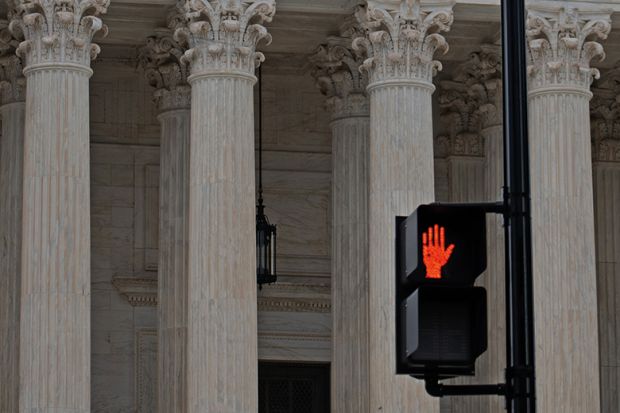The recent scandals at the Countess of Chester Hospital and the British Museum repeated a familiar pattern in UK public life – whistleblowing, followed by the vigorous sweeping of matters under the carpet, orchestrated at the very highest levels of management.
The results were catastrophic. Neonatal nurse Lucy Letby was able to murder at least seven babies at the hospital before finally being removed from duties and reported to the police, despite senior doctors having raised the alarm about her much earlier. And thousands of artefacts were lost or stolen from the museum’s storehouse despite the warning given by an antiques dealer who saw some of the items being sold online.
That pattern is also evident at UK universities. The reaction to my recent Times Higher Education article “Bullying is a feature of UK universities, not a bug” (30 August) was an outpouring of pain and distress that reinforced my argument. Grave abuses – serious academic or financial malpractice, extreme and persistent bullying, sexual harassment, even threats to the safety and life of an individual – occur much more often in UK academia than many would like to think.
After all, a large UK university typically employs between 10,000 and 15,000 staff. As in any large group of human beings, there will be some bad apples among them, including among senior staff. The majority of the abuses reported to me since my previous article derived from untrammelled power at those senior levels (head of department and above). And that is one reason why precious little is ever done about them.
Another is reputational risk. Regardless of who is accused of misconduct, management’s instinct is to protect them in order to defend the reputation of the institution. Indeed, senior administrators identify themselves as the institution, so the driving factor ultimately becomes self-protection – even in universities that like to flaunt their “best practices”.
It is all too easy for senior management to suppress unwelcome reports of misconduct – and, if they persist, to disparage whistleblowers or threaten them with disciplinary action, as occurred in the British Museum and Countess of Chester cases.
Whistleblowers have legal protection against detriment under the Public Interest Disclosure Act, but, in practice, even the most senior administrators are oblivious to that, and HR departments’ reaction is “So what?” Or, at my university, they say: “You may voice this matter to whomever you think is the appropriate interlocutor.”
Internal university grievance policies, such as Dignity at Work, are not statutory. Hence, your university can make and break its own procedures with impunity. Rules can be ignored or subverted, and there are no enforceable repercussions.
If the abuse involved law-breaking, external remedies become possible, either in the courts or by appeal to the regulators (such as the Health and Safety Executive). But then, your university will employ the Donald Trump method and go on the attack.
You are an isolated individual, easily intimidated by an institution that has access to many more resources than you do. You may receive letters from your university’s legal department about your “vexatious behaviour” and threatening to claim many thousands of pounds’ worth of damages from you.
To break this wall of resistance, we need a panel of external adjudicators. Just as the Financial Conduct Authority is independent yet funded by fees from the regulated banks, so universities should be required to fund a University Ombudsman Service (UOS).
All complaints by staff should be reported to the UOS so that statistics can be monitored. The university is then given four months to resolve the matter. At the end of this, if the matter is still not fixed, then the UOS takes over the investigation.
Hence, in practice, the UOS becomes responsible for investigating the most serious concerns. Its independence means that no investigation can be stopped, or even influenced, by a university’s senior management, HR or legal department. Nor can it be influenced by whistleblowers, who can sometimes be obsessive or just plain mistaken. Neither the whistleblower nor the university owns the investigation. The UOS does.
Students already have the Office of the Independent Adjudicator for Higher Education (OIA) to appeal to regarding poor service, mistreatment or a decision of a university’s disciplinary body. In that regard, students presently have more rights than university staff do. The UOS could take over dealing with complaints from students as well.
Ombudsmen’s reports should be made public. The over-mighty may need to be held to account. But the purpose of the UOS is not just to apportion blame, but also to find out what really happened and to provide intelligent solutions so that universities avoid any repeat.
Of course, an open, responsive university does not need whistleblowing to address abuses. It addresses problems consistently and in good faith as they arise. Hence, it does not need an ombudsman, either. But if my email inbox in the days and weeks after my previous article is anything to go by, the UOS will have an enormous workload.
Wyn Evans is professor of astrophysics at the Institute of Astronomy, University of Cambridge. With colleagues, he is working on a web hub offering advice and peer-to-peer support on bullying in academia.
Register to continue
Why register?
- Registration is free and only takes a moment
- Once registered, you can read 3 articles a month
- Sign up for our newsletter
Subscribe
Or subscribe for unlimited access to:
- Unlimited access to news, views, insights & reviews
- Digital editions
- Digital access to THE’s university and college rankings analysis
Already registered or a current subscriber?








